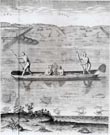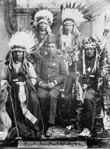Join us for conversations that inspire, recognize, and encourage innovation and best practices in the education profession.
Available on Apple Podcasts, Spotify, Google Podcasts, and more.
This timeline places literary publications (shaded) in their historical contexts.
Columbus lands in the Bahamas, returns to Spain with first Indian slaves
Geographer Martin Waldseemüller names the “new” land “America” for Vespucci
Spanish Laws of Burgos forbid enslavement of Indians and advocate Christian conversion

Bernardino de Sahagûn, Florentine Codex
Spanish begin settling New Mexico
Thomas Harriot, A Brief and True Report of the New Found Land of Virginia
First Spanish colony on the Rio Grande, establishing control over Pueblo Indians
Garcilaso de la Vega, The Florida of the Inca
First Indian uprising in an English colony: Powhatan Confederacy attacks Jamestown
Pequot War
Roger Williams, A Key into the Language of America
King Philip’s War decimates native tribes in New England
Approximately fourteen hundred Indian slaves in the North American colonies
French and Indian War establishes English possession of Northeast
Samson Occom, A Short Narrative of My Life (1768)
Pontiac’s War
Continental Congress establishes first treaty with Indian tribe, the Delaware
Northwest Ordinance approved by Confederation Congress
Congress enacts first law regulating trade and land sales with Indians
War of 1812, the last war in which Indians fight with a foreign colonial power against the United States
First appropriation by Congress of a fund ($10,000) to “civilize” the Indians
Cherokee Memorials
Bureau of Indian Affairs established
Cherokee Nation ratifies its new constitution
William Apess, “An Indian’s Looking-Glass for the White Man”
Congress passes Indian Removal Act, legalizing removal of eastern Indians to west of the Mississippi
Cherokees travel the Trail of Tears
Mexican War; Southwest is ceded to the United States
Bureau of Indian Affairs shifts from War Department to the Department of the Interior
California Gold Rush
John Rollin Ridge (Yellow Bird), The Life and Adventures of Joaquin Murieta, the Celebrated California Bandit
United States war against Plains Indians
Standing Bear court case establishes that Indians are “persons within the meaning of the law”
Cochise, “[I am alone]”
Charlot, “[He has filled graves with our bones]”
Lorenzo Asisara, “Punishment”‘
Congress appropriates first sum earmarked for federal administration of Indian education
Congress passes a law putting an end to further treaties with Indian tribes
General Custer and his Seventh Cavalry defeated by Sioux and Cheyenne in Battle of Little Big Horn
Congress appropriates first funds for Indian police
Carlisle Indian School founded
Geronimo and his band of Apaches captured, ending Indian fighting in Southwest
Dawes Severalty (General Allotment) Act redistributes tribally held lands
Paiute Wovoka inaugurates Ghost Dance religion

Franz Boas, Chinook Texts
Massacre of nearly 300 Indians at Wounded Knee ends Indian resistance to U.S. government
James Mooney, The Ghost Dance Religion and the Sioux Outbreak of 1890
Curtis Act dissolves tribal governments
Zitkala Sa (Gertrude Simmons Bonnin), “Impressions of an Indian Childhood,” “The School Days of an Indian Girl,” “An Indian Teacher among Indians”
Frances Densmore, Chippewa Songs
Selin Williams, “The Bungling Host”
Charles Alexander Eastman, From the Deep Woods to Civilization
Congress makes all Indians U.S. citizens and grants them the right to vote
Black Elk and John G. Neihardt, Black Elk Speaks
Ella Cara Deloria, Dakota Texts
Mourning Dove, Coyote Stories
D’arcy McNickle, The Surrounded
Congress passes Wheeler-Howard (Indian Reorganization) Act, ending Dawes era
Founding of National Congress of American Indians
Congress establishes Indian Claims Commission to judge all tribal claims
Paul Radin, The Trickster
Congress adopts House Concurrent Resolution 180, declaring its intent to terminate treaty relations with Indian tribes
Hugh Yellowman, “Coyote, Skunk, and the Prairie Dogs”
N. Scott Momaday, The Way to Rainy Mountain
Alexander Posey, Poems of Alexander Lawrence Posey, Creek Indian Bard
Vine Deloria, God Is Red
American Indian Movement members occupy Wounded Knee and battle FBI agents
John Bierhorst, Four Masterworks of American Indian Literature: Quetzalcoatl, The Ritual of Condolence, Cuceb, the Night Chant
Simon J. Ortiz, Poems from the Veterans Hospital
Leslie Marmon Silko, Ceremony
Joy Harjo, She Had Some Horses
Louise Erdrich, “Fleur”
Paula Gunn Allen, The Sacred Hoop
Luci Tapahonso, A Breeze Swept Through
Joy Harjo, In Mad Love and War
Congress passes Native American Graves Protection and Repatriation Act, protecting Indian remains and sacred objects
Gerald Vizenor, Landfill Meditations: Crossblood Stories
Simon J. Ortiz, Woven Stone
Luci Tapahonso, Saanii Dahataal: The Women Are Singing
Greg Sarris, Mabel McKay: Weaving the Dream
Joy Harjo, The Woman Who Fell from the Sky
Diane Glancy, Firesticks